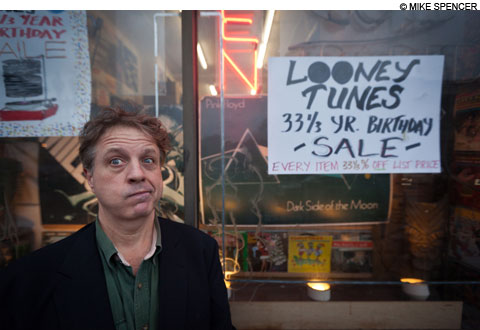
PAT MCGRATH has owned Looney Tunes Records for 30 years. He says records never go out of style.
|
Among the faded LP sleeves crowding the Boylston-facing windows of Looney Tunes Records is a carefully hand-lettered sign written in black marker: "33 1/3 YEAR BIRTHDAY SALE. EVERY ITEM 33 1/3 % OFF LIST PRICE."Inside, the narrow, high-ceilinged space — once the site of a dental-supply outlet — is chockablock with used CDs, DVDs, and row upon row of vinyl. Browsers — all men, whenever I've visited — thumb through cascades of cardboard sleeves while navigating the stacks of cardboard boxes wedged underneath the shelves.
"I have something of a record problem," owner Pat McGrath tells me over iced coffee.
McGrath is a pleasingly rumpled, exceedingly polite Southern gent who grew up in Florida and West Virginia. He moved to Boston to major in English at BU, a school he chose because of its generous scholarship offer — and the preponderance of record stores around it. McGrath was still an undergrad when he started working at Looney Tunes as a clerk, the day after it opened. Three years later, he bought the joint. Thirty years after that, the record store is an endangered species.
"We have succeeded where so many have failed because I am this, McGrath says, pinching his fingers together and squinting through them in the manner of Mark McKinney crushing the head of a passerby, "just this much more smart than stupid."
McGrath attributes his store's longevity to its generous scope. "The [record stores] who still exist are those that cover the broadest range," he says, noting the demise of specialized record stores. "Besides, when a lot of record stores were going out of business, they were complaining, 'All I see in here is gray ponytails.' Well, why is that gray-ponytail money bad? I'll take that gray-ponytail money."
The number of gray ponytails and other Looney Tunes shoppers has remained fairly constant over the years, McGrath says. However, the recession has had a serious impact on the store's profits: records sell for just about a third of what they would have four years ago.
McGrath makes up for his losses as he always has: by selling off valuable records from his own collection, which he started in 1965 at the age of eight. At this point, he says, he has no idea how many records he owns. "I really don't think that anybody who has an approximate notion of how many records they have," he says, "have all that fucking many."
McGrath readily admits that he prefers records to finance. Recently, he gave a talk for a Berklee business class. A student asked how he dealt with the hundreds of thousands of items in his store. "I pretty much put them on a shelf in alphabetical order," he told them.
The class suggested he get a good database, or at least a computer. But McGrath scoffs that bringing the record store up to date would be like "having a state-of-the-art chariot."
"It's not of the modern world, exactly," he said.